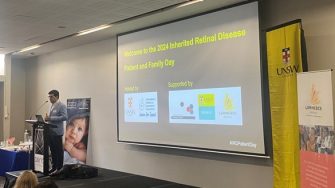
On 23 March, more than 120 individuals impacted by an inherited retinal disease (IRD), health professionals and researchers came together in Sydney to learn about current research and advanced therapies for inherited retinal diseases, connect with others, and share their experiences.
This event was proudly co-hosted by UNSW Medicine & Health (Discipline of Paediatrics) and the Stem Cell Medicine Group at the Children’s Medical Research Institute (CMRI). It was made possible by funding from the Medical Research Future Fund Stem Cell Mission (Chief Investigator: Associate Professor Anai Gonzalez-Cordero, CMRI), UNSW Medicine & Health, and Luminesce Alliance.
Inherited retinal diseases are the leading cause of blindness in adults, affecting around 1 in 4,000 people. They are currently untreatable, with the exception of RPE65-associated retinal dystrophy. As with many rare conditions, individuals with an IRD and their families often struggle to access relevant, reliable, and accessible information about their condition. This can become even more complex within the rapid advancements into the diagnosis and treatment for different IRDs.
The first Australian Inherited Retinal Disease Patient and Family Engagement Day was opened with a welcome video from the Hon Mark Butler, Minister for Health and Aged Care. Minster Butler set the scene for the event:
“I want to acknowledge the dedication of researchers, health professionals and community organisations here today and working in this sector – those who strive to improve the diagnosis, management and treatment of Inherited Retinal Diseases…. My hope for you today is that this Patient and Family event will be encouraging. I am excited about the new research, and I hope you are too.”
With the MC talents of Santiago Valesquez and his guide dog Trey, we were introduced to six guest speakers over the course of the day. Presentations including the current and future diagnosis and management of IRDs, gene therapy and recreating diseases in the lab to identify new treatments.
During both morning tea and lunch, attendees had the opportunity to connect with one another and health professionals. They also were invited to chat with researchers at the research posters display and community organisations, such as Children’s Medical Research Institute, Retina Australia and Guide Dogs NSW/ACT, at the exhibitor booths.
Caption: Children’s Medical Research Institute booth at lunchtime, extracting DNA from strawberries with several of our attendees. Image: provided
Following lunch, a live panel, was skilfully facilitated by ABC's disability affairs reporter, Nas Campanella, who also shared her experiences living with her vision loss. The panel discussion centred around the impacts of living with an IRD and reflections from the panel members around living well with an IRD.
“Something that’s really important to be able to teach your children is, if they do have a vision impairment or any sort of disability, ‘tell their friends what they need from them and why you need it’… If you don’t tell them, they’re not going to understand.” - Jenna Jones
Caption: From left to right, Nas Campanella (Panel chair), Dr Meredith Prain (lived experience), Jenna Jones (lived experience), Junko Katsuda (mother of Arato), Arato Katsuda (lived experience), Dr Ceecee Britten-Jones (clinician-researcher). Image: provided
A recurrent theme over the day was the value in researchers engaging with individuals living with an IRD, sharing updates and opportunities for participation in research. Associate Professor Anai Gonzalez-Cordero who leads the Stem Cell Medicine Group at CMRI highlighted the importance of patient and family engagement days like this for both families and researchers:
“The interaction with patients is tremendously beneficial to our researchers. This has been great for them to understand the impact that their work can have in real life.”
The successful event aligns with a broader project that is currently being conducted in partnership between the event co-hosts, UNSW Medicine & Health and the Stem Cell Medicine Group from CMRI to identify the research priorities from the perspective of those impacted by an IRD.
For more information about the research priorities project or event (including access to presentation recordings), please email visionloss@unsw.edu.au.
